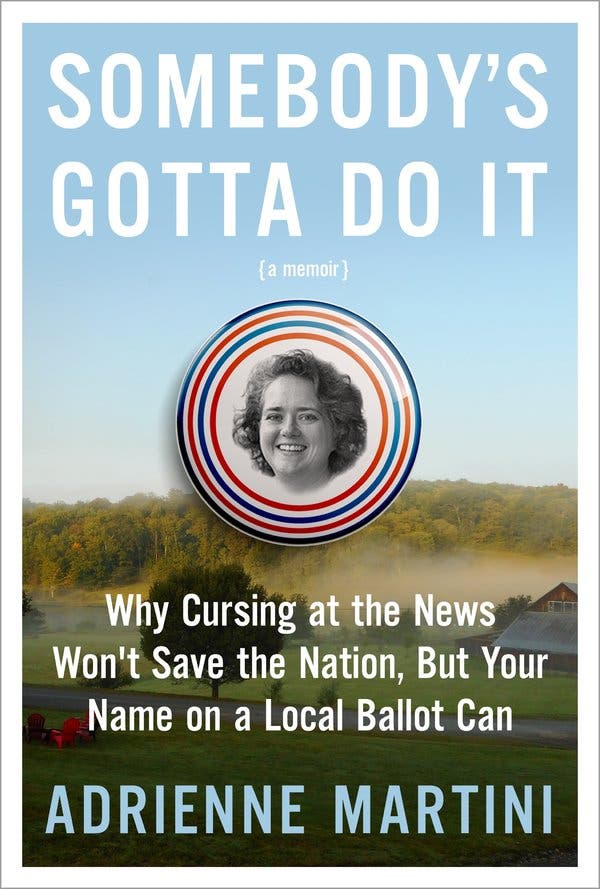SOMEBODY’S GOTTA DO IT
Why Cursing at the News Won’t Save the Nation, but Your Name on a Local Ballot Can
By Adrienne Martini
Adrienne Martini’s “Somebody’s Gotta Do It” is 50 percent memoir, 50 percent advice manual and 100 percent heart. Gutted by Donald Trump’s 2016 presidential win, unsatisfied after knitting “an ocean of pussyhats,” Martini — a theater major turned journalist whose first two memoirs were about depression and tackling the Holy Grail of sweater patterns — found herself campaigning for the District 12 seat on the Otsego County Board in upstate New York. When she won, she joined 14 delegates overseeing a budget of $130 million, covering social services, mental health services, road maintenance, law enforcement, emergency services, waste disposal, code enforcement and legal services, among other necessities. (“Oh, and we’d like to keep our green spaces green and our watersheds blue. We’d also like not to have our elderly and infirm residents starve or freeze.”)
A book aimed at incentivizing people to run for local office could read the way sawdust tastes, but Martini spices up her subject with pithy humor, wry backhands directed at the patriarchy and (most important) clear advice on how to follow her lead. She admits that she used to observe politics from the sidelines — “ I’d built a comfortable bench, complete with Orla Kiely cushions and a Starbucks skinny white chocolate mocha” — then shows readers exactly how she walked onto the field.
This is not your standard focus-group-approved politician fare; it’s an honest, in-the-moment, firsthand account of a disappointed mother’s foray into local politics. When her opponent and/or his volunteers plant his lawn signs directly in front of hers, Martini complains to her husband, wondering if she should “go all Lebowski-y” before deciding that she’s already invested enough time in lawn sign logistics. Martini tells it like it is, doling out levelheaded instruction while condemning Trump enablers with fiery scorn. (“Yes, yes, I find Trump himself distasteful, but it’s the grifters around him who really burn my biscuits.”)

As she navigates the costs of print fliers and public service, Martini acknowledges the comfortable lifestyle that allows her to overcome political roadblocks with relative success and ease. Only in the wake of Trump’s presidency does Martini realize the fallacy of America’s equal playing field; she admits she has been “slow on the uptake” and she’s sorry about that. (“Truly I am. But I’ve got the memo now.”)
When knocking on doors, Martini wonders what the experience would be like if she were not a middle-aged white lady. Once on the board, she points out that she is in the enviable position of being able to work part time at her “actual job” in SUNY Oneonta’s alumni office because she can rely on her partner’s paycheck. She uses this privilege to make change: In an effort to diversify the board, half of Martini’s initial platform is to change the meeting times so that citizens not yet old enough to collect Social Security can engage without compromising their livelihoods.
Martini shows how critical issues of local government mirror the ones facing the nation. These include the opioid epidemic, affordable housing, fracking, transgender wellness, access to broadband and balancing the budget. She interviews a range of recently elected officials, including a mother who wonders if her marriage was the price she paid for her seat. These perspectives enrich Martini’s narrative, but what really blew my mind was her exploration of the history of corruption in the coroner’s office, which is as disturbing as it is fascinating.
“Somebody’s Gotta Do It” isn’t sexy or scandal-ridden — and that’s the point. Martini shows how “running for a local office takes a small amount of cash and a lot of time and moxie,” and confesses that her time in government thus far “is simultaneously the most fascinating and the most tedious thing I have ever done.” The reader becomes Martini’s running partner on a route that is disproportionately uphill in the pursuit of a more perfect union. The challenge is worth the effort because, as Martini puts it, “Running very slowly while crying is still moving forward.” I have yet to read a better summary of public service.
 EU News Digest Latest News & Updates
EU News Digest Latest News & Updates



